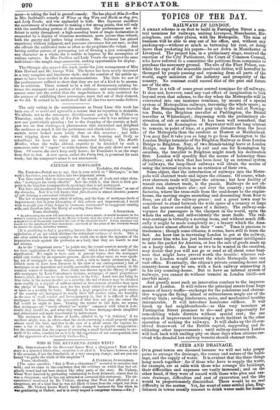TOPICS OF THE DAY.
RAILWAYS IN LONDON.
A GREAT scheme is on foot to build in Farringdon Street a can terminus for railways, uniting Liverpool, Manchester, Bir-
mingham, and other places, with the Metropolis. The man of business will be able to step out of his office, and, without any packing-up—without so much as buttoning his coat, or doing more than pocketing his papers—be set down in Manchester or Liverpool. The project has, in a preliminary stage, received the sanction of the City Parliament, the Court of Common Council, who have referred to a committee the petitions from companies to purchase the necessary ground. The site of the Fleet Prison, ere.. while the cage of the miserable insolvent debtor, will hereafter be thronged by people passing and repassing from all parts of the world, eager ministers of the industry and prosperity of the country. No contrast could exceed that of the past and future use of the site.
There is a talk of some great central terminus for all railways. It does not, however, need any vast effort of imagination to look beyond even that scheme, to the day when the Metropolis will be converted into one immense terminus, by means of a special system of Metropolitan railways, traversing the whole space ; so that the Birmingham traveller may take to the rail at Newing- ton Butts, the Brighton traveller at Paddington, the Bristol traveller at Whitechapel ; dispensing with the preliminary ob- struction of cab or omnibus. It has been well remarked, that the resident at Kensington or Bayswater will not long consent to remain, in point of time, at a greater distance from the heart of the Metropolis than the resident at Harrow or Maidenhead. You may find it take you as long to go from Kensington to the London Bridge terminus of the Brighton Railway as from London Bridge to Brighton. Nay, of two friends taking leave at London Bridge, one for Brighton by rail and one for Kensington by omnibus, the traveller to Brighton might reach his destination first. London will speedily find the means of balancing these disparities ; and when that has been done by an internal system of railways, the long-lined railways will obtain the means of using the internal system as an extension of their own. Some object, that the introduction of railways into the Metro- polis will obstruct trade and injure the citizens. Of course, what- ever obstructs trade will injure the citizens ; but how facility of transit can obstruct trade, is the puzzle. Railways do not ob- struct trade anywhere else : not over the country ; nor within factories, where the tram-rails from the coal-house to the engine- house, the moving stages ascending and descending from floor to floor, are all of the railway genus : and a great town may be considered to stand between the wide space of a country at large and the narrow crowded space of a factory. The railway-con- veyance for passengers is the cheapest in the world, upon the whole the safest, and self-evidently the most facile. The rail- way-carriage is virtually a moving room, and without much diffi- culty it might be made completely so ; a luxury which the Ame- ricans have almost effected in their "cars." Time is precious to tradesmen ; though some citizens, it seems, have still to learn the fact. An hour lost in traversing London to get at the railway, may cause him who has just learned some important intelligence to miss the packet for America, or lose the sale of goods made up on a hasty order. An hour or two to be wasted in the omnibus, may decide that you will not go or send at all about some busi- ness that might have proved worth the trouble : whereas rail- ways ire London would convert the whole Metropolis into one vast office. Eventually, the citizen's private counting-house and country-house may be one, with a back railway connecting it to his city counting-house. But to have an internal system of railways, you cannot do without termini in London itself—not one but many.
And greatly must such an innovation conduce to the improve- ment of London. It will relieve the principal streets from huge masses of heavy traffic--exchange for the ponderous and obstruc- tive waggon the flying island or subterranean magic car of the railway train ; saving hinderance, noise, and mechanical troubles innumerable. It will introduce handsome edifices. It will break up bad neighbourhoods—as this very terminus at Farringdon Street promises to do—and give opportunity for remodelling whole districts without special cost ; the one operation of improvement becoming a mere incident in the other operation of making the railways. It will shake up the ill-con- trived framework of the British capital, suggesting and fa- cilitating other improvements ; until railway-traversed London will look back with smiling pity on those days when citizens sur- vived who dreaded lest railway termini should obstruct trade.


























 Previous page
Previous page